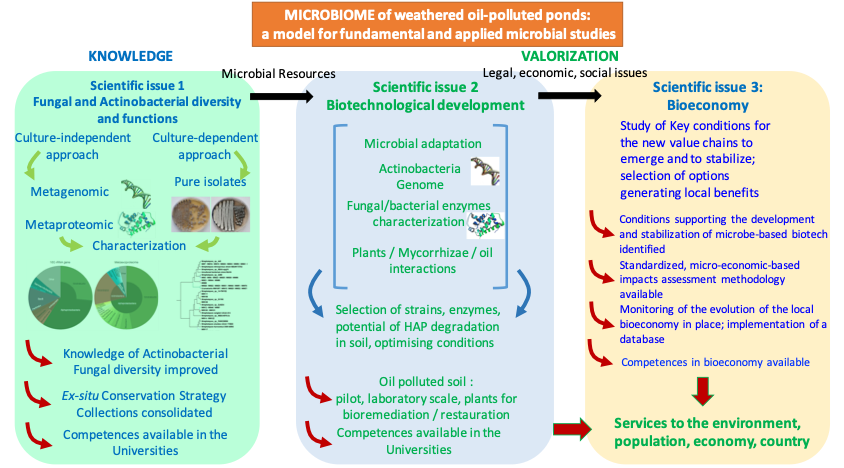This five-year project is a continuation of a previous collaboration establishing biotechnology-oriented Microbial Resource Centres in Ecuador. Its global objective is to consolidate initiatives for the knowledge of the microbiome and its valorisation, through biotechnology, into knowledge-based bioeconomies. The need to transform the currently Ecuadorian, predominantly extractive economy towards an alternative model of knowledge-based bioeconomy, valuing the biodiversity potential, is strongly emphasized locally and regionally.
Ecuador is a biodiversity hotspot, which is a key resource for the development of bioeconomy. The local scientific, technical, economic, and legislative capacities are still weak, however, and this biodiversity, especially its microbial component, is little characterized. As well, the economic and legal conditions for the emergence of value chains developing and commercializing biotechnology applications on lines with the Nagoya Protocol are little developed. Altogether, this prevents the local scientists from understanding the potential value of this microbial diversity.
This new project is to reinforce the competences in microbial studies and development of microbe-based biotech from model (“pilots”) to services or product development, commercialized through local value chains. Specifically, the project will focus, through assessment and characterization of segments of the microbiome inhabiting weathered oil polluted ponds, on the development of innovative bioremediation / restauration processes of oil-polluted soils. Without anticipating on the results of a thorough socio-economic and environmental analysis, developing innovative services to cope with liabilities caused by oil industries will contribute to the development of Ecuadorian based value chain, meet a recurrent request of the Ecuadorian society and also contribute to the restoration of ecosystemic services. The PRD intends:
1. To improve the understanding of the taxonomic and functional diversity of microbial communities of weathered oil polluted ponds;
2. To develop two laboratory scale pilots for microbe-based remediation and phytoremediation of oil polluted soil;
3. To develop a methodology for socio-economic and environmental spatialized impacts assessment and a database enabling the geo-digitalization of value chains of the local bioeconomy.

These will be done through 5 PhD Thesis:
- Taxonomy, ecology, and physiological properties of non-mycorrhizal, saprobic Fungi associated with plant debris in oil ponds and neighbouring Amazonian areas.
- Arbuscular Mycorrhizal Fungi diversity and interactions with plants in weathered oil ponds and application into phytoremediation for vegetation restauration.
- Actinobacteria associated with oil ponds in the Ecuadorean Amazon forest: Unveiling their role in plant communities’ re-colonization and assessment of their potential as antibiotic producers
- Evaluation of the efficacy of bioremediation with the use of Ecuadorian microbiome applied to the local soil
- Conditions to support the development, stabilization and monitoring of the Ecuadorian bio-economy projects and value chains
Partnership
The consortium joins several teams in Belgium from the Université catholique de Louvain, including the BCCM/MUCL culture collection, and Université de Liège, and two universities in Ecuador, the Pontificia Universidad del Ecuador and the Universidad Tecnica Particular de Loja. The project is sponsored by ARES[1] through a five-year PRD (Project for Research and Development) program
Involvement
BCCM/MUCL will focus its activities on taxonomy, ecology, and physiology of non-mycorrhizal, saprobic Fungi associated with plant debris in oil ponds and neighbouring Amazonian areas, and on the study of AMF diversity and interactions with plants in weathered oil ponds and application into phytoremediation for vegetation restauration.

Vegetation recolonizing crude oil weathered ponds in the Amazonia area
[1] Académie de Recherche et d’Enseignement Supérieur, Fédération Wallonie-Bruxelles
